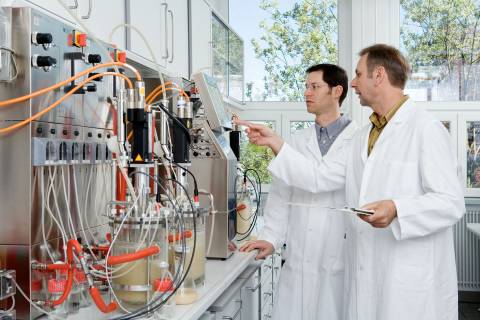The Consortium’s research activities focus on highly promising markets, in other words, global megatrends. The chemical industry is expected to supply more than just chemicals. What the markets demand are functional materials with defined properties that will solve specific problems.
That’s why the Consortium no longer starts by developing new chemical substances and then trying to find applications for them. Instead, we take the exact opposite approach: we identify challenges that the market faces, extrapolate the property sets needed to meet those challenges, and then specifically develop new materials that draw upon our core competencies.
WACKER maintains an intense dialogue, and pursues fruitful collaborations, with the scientific community. Together with the Technical University of Munich, for instance, we run the TUM WACKER Institute for Industrial Biotechnology, which serves as an important source of ideas for our own research work. Intense collaboration between industry and academia is essential if Europe is to be competitive. A further advantage of having Europe as a center of research is that the continent’s established legal systems are designed to protect intellectual property.

Knowledge and education are our most important resources in Europe. Another benefit that Europe offers is its extensive network of excellent, globally respected universities, state-sponsored research institutions, and industry.

From 1903 to the Present Day
Alexander Wacker established the “Consortium für elektrochemische Industrie” in Nuremberg back in 1903 for the purpose of recycling acetylene. He defined the object of the fledgling company – what we would nowadays call a start-up – as the pursuit of advances in (electro)chemistry to discover, expand and exploit (electro)chemical processes, as well as to sell chemical products.
In 1918, the Consortium moved from Nuremberg to Munich, where it still operates at the same address. It celebrated its centennial in 2003, when it hosted an international scientific symposium.
Wacker Chemie AG was founded on systematic research, and systematic research continues to drive the company’s enduring success.
A current focus of the basic research carried out by the Consortium deals with the chemistry of low-valence silicon for medium-to-long-term use in industrial applications such as catalysis. Sustainability is also a key research area. This includes contributions to the circular economy and the use of sustainable raw materials to continually reduce the carbon footprint of our products. Another research focus is ESETEC®, our proprietary production system for biopharmaceuticals (biologics).






